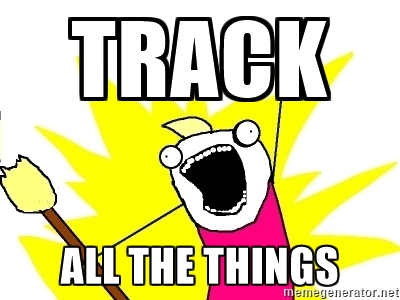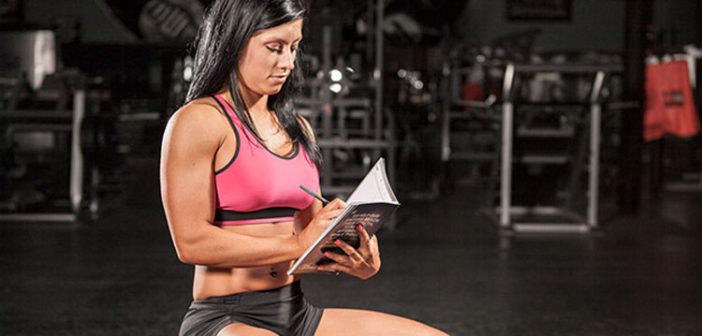Peter Drucker was a revered figure in the business world, who famously quoted: “if you can’t measure it, you can’t improve it.” In the corporate world this statement is held as gospel, resonating ad nauseam throughout all tiers of management.
And for good reason; because it’s a damn good approach.
The beauty of this statement lies in its vast applicability to most professions and personal endeavors. If you’re not measuring, you’re not progressing. The line between success and failure will become so blurred that you’ll find yourself stumbling when asked a simple question about your direction.
Now, onto my main points.
Track your training progression.
If you’re even slightly interested in making any kind of performance improvement, I’m going to emphasize something for you as strongly as I can convey it through the written word.
You *must* (bold surrounded by asterisks – I’m serious) be tracking whatever you’re doing. Especially at the gym, and especially when laying the foundations for a new objective that will be occupying your time over the medium to long-term.
Do you have a baseline or a starting point? How will you know if you’re successful? How can I help you get there?
These are all standard management questions, and questions that a good personal trainer will ask you.
See the similarity here? Time, effort, and planning are key factors in both business and in physical pursuits.
My most uninspiring times are always felt between training cycles, or when I’m unsure what I’d like to redirect my focus towards working to achieve. Don’t get me wrong, it can sometimes be just as important to throw everything out for a couple of sessions to simply have fun and freestyle it. But, over time, the lack of direction becomes disheartening and leads to burning out and losing your drive.
In fact, I’d recently set aside a few weeks to recover from a shoulder niggle. My earlier training program had been put on a temporary hiatus and I abode by the whatever doesn’t hurt my left shoulder method.
Why did I mention this?
Because I still continued to track what I was doing. More specifically, when I saw my shoulder prehabilitation numbers steadily increasing, I know my recovery was coming along nicely. No one likes not being able to perform at their best for a period of time, which is exactly why we can gain some satisfaction from the small improvements we write down.

A good starting point
Putting it briefly, here’s why you should be tracking your training progression:
- Progress is immensely gratifying, regardless of your experience level or training modality.
- By having everything written down, you’re able to take one quick glance and know what your training week looks like.
- Upfront time and effort to document your training ensures less fuss later. Exhausted and tired from work? Not to worry, your session has already been predetermined.
Track your physical progression.
This one is definitely a favorite for nearly every #bodytransformation contest you’ll come across and has definitely become more common. Here’s what you’ll typically have available to you in your physical change tracking arsenal:
- Scale.
- Photos.
- Dexa scanning.
Scales are objective, easy to use, and we’re by no means unfamiliar with them. The number that shows up is what you’re working with at that point, however they are notoriously deceiving. Unfortunately, our weight is known to fluctuate more than the stock market and thus, whatever we see on the scales should be taken with a grain of salt (heh, sodium).
The human body is one incredibly complex piece of machinery. There are things going in, coming out, transforming, and dissolving all of the time. As a result, your weight can fluctuate wildly over the course of a 24-48 hour period. Depending on what you ate today, how much water you drank, if there was sodium in your food, what kind of clothing you were wearing, what time of day you weigh yourself, your weight WILL be different. – Nerd Fitness
Photos are more subjective. If you’re using them to track your physical changes, you must be stringent with your setup. Same lighting, angles, camera distance are important. Of course, cheating the system is super easy if you’re going to post your photos online. However, this makes no sense if you’re simply doing it for yourself. You can lie to others, but lying to yourself is the worst route you can take.
Don’t do this.
*Oh, and for the male readers, don’t forget to take progress photos of your legs! “Leg day” memes are now a dime a dozen online. 😉
DEXA scanning is the gold standard for body composition testing. Short for dual energy x-ray absorptiometry, the DEXA scan can provide you with information such as muscle and fat mass readings, body fat percentage and bone mineral density. This information is not available to you from simply standing on the scales or observing photos.
If your goal is to lose weight (lose fat mass), increase muscle (lean mass) or both, then it is extremely important that you are aware if you are reaching your goals and accurately benchmark and track changes in your muscle and fat tissue. – measureup.com.au

The DEXA scan experience
What about tracking food intake?
I’m going to come out and say it, even though it’s an unpopular opinion among purists.
I’m not a fan of tracking the calories of everything I consume.
By tracking, I mean entering each meal of the day into one of the many diet tracking apps like MyFitnessPal. The reason I don’t advocate it long-term is because I believe it could build an obsessive tendency towards food and become a hindrance, especially if you believe you have OCD tendencies.
However, I will concede that it’s definitely beneficial, especially if you don’t really understand how many calories you typically consume on the average day when starting out. Tracking food intake early also improves your understanding of the three macronutrients (protein, fat and carbohydrate) and how your body reacts to consumption of certain types of foods.
Resources you can use.
There’s no need for me to reinvent the wheel when I can point to the most beneficial, constantly evolving list of fitness resources I’ve seen online. And that is the /r/fitness subreddit resources page. If you’ve used another resource, or would like to discuss your experience with one of these apps, leave a comment below.
By learning to track your training and physical progression, you’ll be surprised how quickly you can make small improvements each week. This eliminates all guesswork and ensures you’ve set a standard for yourself that can be adhered to for many years to come.
Did you enjoy this post? Receive one weekly update containing knowledge, tips and actionable content delivered straight to you. Strictly no spam.

